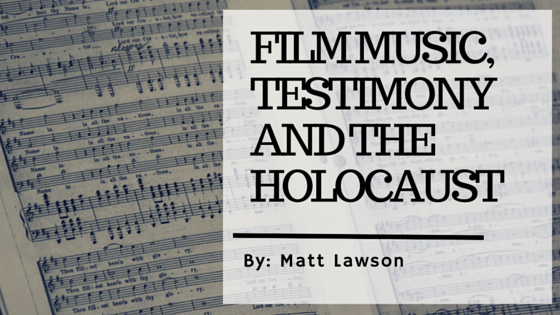Film Music, Testimony and the Holocaust by: Matt Lawson
When I commenced my PhD journey three years ago at Edge Hill University in northern England, I had little idea of where the journey would take me, both literally and figuratively. It is therefore difficult to comprehend that three years after my first ever conference presentation, and just three weeks after submitting my 80,000+ word thesis on the use of film music in German Holocaust cinema, I find myself invited to give a paper in Los Angeles at USC Shoah Foundation’s Center for Advance Genocide Research academic symposium, Singing in the Lion’s Mouth: Music as Resistance to Genocide. This event is the culmination of my time as a doctoral student since beginning back in 2012, and the first time I will have visited and presented on the west coast of America.
The event taking place on Oct 10 -11, includes two days of programming that highlight the use of music as a tool to resist oppression and spread awareness. Why then, you may be thinking, am I bringing film music in to the equation?
Film music is unique in musicological circles, as it is almost always firmly attached to a visual. While much of the music investigated at the workshop will be in the form of direct responses to genocide, film music’s impact upon real life situations is always diluted through the medium of film. It isn’t a direct form of representing the Holocaust, but one which is reflected sometimes generations later through a differing art form.

When I was considering the links between my film music research and the workshop for my paper, but also the role of the USC Shoah Foundation more broadly, I kept returning to the words ‘testimony’ and ‘resistance’. Testimony, in general terms, is a formal spoken or written statement about an event, usually by someone who witnessed it. Can testimony be musical, however? I might argue that the emotive violin theme to Schindler’s List (1993) is a strong statement about an event. John Williams, the composer, wasn’t there during the Holocaust, but he is boldly adding his own statement or reaction to the event. Does that make it testimony?
What of resistance? Likewise, much of the music discussed at the upcoming workshop will have occurred during the Holocaust itself, or in direct response to it. Can film music truly provide resistance against genocide? The truth is, I’m not sure. My paper will ask the question with the use of case studies, but I will leave the question very open, in order to provoke an interesting debate in the following Q+A session.
The link, therefore, between film music and this workshop may appear superficially tenuous. This only highlights a key strength of the USC Shoah Foundation; issues surrounding the remembrance, representation and engagement with the Holocaust will continue to evolve and travel along new paths of research, even if they seem out of the box at first glance. A cursory glance at the workshop’s academic symposium program reinforces this eclectic approach to the weekend, with a wide variety of papers. It will be an incredibly rewarding experience to engage with scholars and USC Shoah Foundation colleagues from all over the world, and in some cases, new working relationships may be established which will continue long after our flights have departed in various directions.
My doctoral journey has been one of tumultuous highs and lows, but to round off the three years by visiting Los Angeles, in the company of esteemed colleagues at the world-renowned USC Shoah Foundation, is a truly humbling moment. Attending the two-day workshop makes me both very proud on a personal level, but also gives me a feeling of great anticipation for the future of both my scholarly research, and our ongoing engagement with the Holocaust.